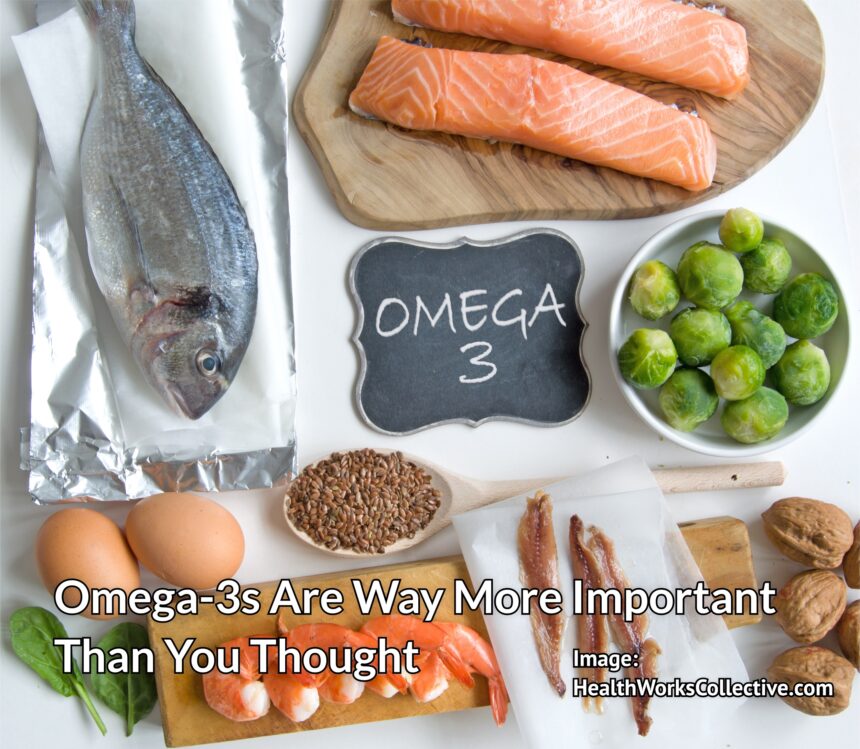For years after I transitioned to a mostly plant-based diet, I thought I was doing pretty good with my omega-3 fatty acid intake. I ate avocados, chia seeds, nuts, flax seeds, and coconut oil. Surely I was good when it came to the fat department, right? Although all of these plant-based foods do contain fat, they contain a different type of fat than those found in fatty fish. Many plant-based sources of fat contain a fat called ALA, which stands for alpha-linolenic acid. ALA is cool and all–and yes, it’s still an omega-3–but it?s not the same as EPA and DHA. Eicosapentaenoic acid and docosahexaenoic acid, respectively, are absolutely essential for our bodies, brains, and skin. These types of fatty acids are largely present in animal products. Since then, I?ve taken my omega-3 intake a little more seriously. Omega-3s are way more important for our health than we thought. Here?s why. Nourishes and Protects the Brain Research has shown that omega-3 intake of fish oil, krill oil, or cod liver oil, has been linked to better brain health. What I mean by this is improved cognitive skills, decreased risk for cognitive disorders such as Alzheimer?s, and better mental health. Your brain is a huge sucker for EPA and DHA?it needs it to function properly. Omega-3s in the form of fish oil help to stop inflammation, which is a key player in many diseases. In fact, inadequate omega-3 intake has been shown to cause fatigue, mood swings, and poor memory. All of these can be linked back to the brain! Prevents Cancer and Chronic Disease We?ve just discussed how omega-3s can help stop inflammation. Fatty acids EPA and DHA have been shown to reduce the risk of not only heart disease but also cancer. People who have a higher intake of omega-3 fats are less likely to get cancer in addition to heart disease and other illnesses and health conditions. Omega-3s can lower blood pressure, lower risk for stroke, reduce plaque in the arteries, and more. When it comes to cancer, experts suspect that omega-3s help to stop chronic inflammation that can increase your risk for cancer. These powerful fatty acids are much more beneficial than you think! Helps Make Healthy Babies If you?re pregnant or planning on becoming pregnant, omega-3 fatty acids will be a huge part of your dietary health. This is because these fats are absolutely crucial for your baby?s development. Your infant?s eye and brain health are largely dependent on your EPA and DHA intake. In addition to this, omega-3 fatty acids have been linked to fewer behavioral problems, higher intelligence, better social skills, and a lower risk of developmental delay or disorders such as autism. Consider taking a quality supplement during your pregnancy to help your baby. Your healthcare provider can help you decide on the best one! Improves Mental Health We talked about how essential fatty acids are for the brain?but did you also know they can help improve your mental health as a part of this? People who regularly consume omega-3s have a lower risk for depression, and people who already have depression have found their symptoms improve when taking omega-3 supplements. Want even more evidence? Research shows that the fatty acid EPA is as effective as Prozac for curbing symptoms of depression! Help Autoimmune Symptoms, Menstrual Pain, Skin, Sleep, and More There are many more health issues that omega-3 fatty acids help with?from helping to stop autoimmune symptoms to being as effective as Ibuprofen for menstrual pain and improving sleep and skin, omega-3 fatty acids are just powerhouses of goodness for our bodies. Do you take an omega-3 supplement? Finding a quality supplement is paramount. Unfortunately, the best supplements are animal-based. Choose a company with sustainable practices and consider adding this crucial food to your diet to help improve your health!

